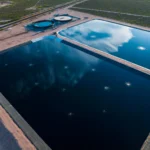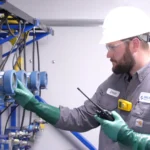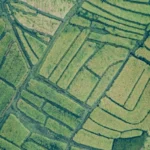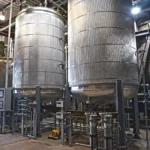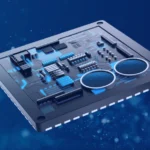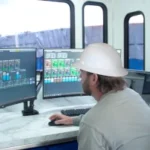Last night as I kissed my son’s forehead and tucked him into bed, he asked, “Dad, aren’t you going to turn off the bathroom lights?” I chuckled as I explained to him that the lights are automatic and that leaving the lights in ‘Auto’ is the best way to save electricity. Just then the lights went out on cue, and my son smiled an understanding grin.
He didn’t realize that he was touching on a subject that is a passion of mine. One of the most significant challenges I am tasked with at Select is ensuring our technology investments are being used properly and effectively. To do that requires a mutual understanding between operators and developers, and a committed team to support the effort.
When I started in water transfer nearly a decade ago, I had no idea that I would be a part of the team that would help transform our industry – to take simple equipment and processes and make them smart equipment and processes.
Preparing for the Landing
I was fresh out of college with a bachelor’s in Economics. I wanted to be a pilot my whole life, and after graduation, I applied for a commissioned position within the United States Air Force. To my dismay, a civilian hiring freeze was instituted by the Air Force that same summer. With a second child on the way, I desperately needed a consistent income and health insurance. Being an Oklahoma native, I decided to explore available positions in the oil and gas industry. Eventually, I came across Select, and they offered me a position doing water transfer work. At the time, I had no idea what that meant.
Day 1: I found myself in the backseat of a 1-ton flatbed truck. I was the fourth man on the crew, and the only available seat held the crew’s industrial-sized Bunn coffee maker. My three new co-workers were not excited about the idea of me replacing their morning coffee. So, my first official job in the oilfield was to hold a coffee maker on my lap as we bumped down country roads in northwest Oklahoma.
The first few months were a challenge for me—working long hours in unfavorable conditions. I was missing the usual baseball games, birthdays, and holidays. There were a lot of difficult days, but I was unwilling to let cold, wet feet and tired, achy muscles quell my drive. As a kid, I worked with my father during the summers doing construction projects. He would always tell me the same thing that his dad told him—you have to work smarter, not harder. It is a simple message that everyone is familiar with, but it is something that has resonated with me since I was just 12 years old.
Day 225: I took my father’s advice literally and enrolled in a Master of Business Administration (MBA) program. The next three years were a blur of sleepless nights, diesel pumps, textbooks, and frac tanks. I became intimately familiar with the equipment and processes involved with running a water transfer job. At the same time, I started to learn the business and what it took for an operation to be efficient.
Day 1,238: After many successful shifts and stages under my belt, the company promoted me to operations manager for our water transfer division in West Texas. There I was given the opportunity to deploy and manage automation systems across my region. The team was developing a strategy to handle some of the simple challenges that made the job unnecessarily complex or difficult. Despite being unfamiliar with how this new technology worked, it did not take me long to realize this is the solution that I had been waiting for.
Day 1,743: In a stroke of luck, I was offered a position as the operational technology operations manager for the entire company—nationwide. In this role, I experienced a learning curve in applying our technology to the unique challenges of each region. With guidance from some great mentors, I was able to help apply our technology in ways that I knew first hand would make an impact on the way our teams functioned.
Day 2,104: On this day, I officially got pilot wings like I always wanted. I proudly became the first Federal Aviation Administration (FAA) Certified Part 107 Unmanned Aerial Vehicle (UAV) pilot for Select. Even though I keep my feet firmly on the ground, I feel very fortunate to be able to fly drones as part of my job. Select’s focus on improving operational technology has kept me excited about the job, in particular the use of unmanned aircraft systems (UAS) in our day-to-day operations.
Today: I’ve had the pleasure of witnessing first-hand how our systems and processes have evolved since I joined Select over 9 years ago. The way that Select has embraced technology to positively impact safety, efficiency, and job quality is one of the most satisfying things I get to be a part of. We use technology to change the old-fashioned ways of running jobs. Through automation, radio networks, supervisory control and data acquisition (SCADA) systems, and instrumentation, we are raising the bar and driving a new culture. At the same time, employees at Select including those in the field, are gaining opportunities to learn new skills with advanced technology and grow in this career path. That would not be possible without Select’s commitment to technology.
Those days starting out were hard-earned, but the knowledge I gained has been critical in contributing to new and unique automation solutions. As I continue to work with our additional service lines, I’m looking forward to applying the same concepts to unlock new possibilities.
